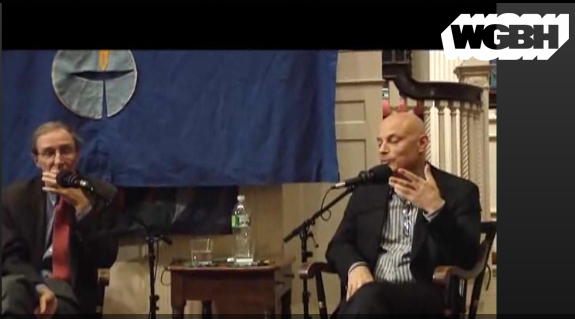The Liberal Backlash Against Freedom
 I’ve recommended Freedom, the new Jonathan Franzen, but I’m not one of those people who thinks it’s an “instant masterpiece.” As a novel, it has some hefty flaws, but the fact remains that Franzen knows how to tell a compelling story, even when he’s cramming Big Issues into the narrative in what comes across as an effort to connect his domestic dramas to the larger world and thus imbue his fiction with larger significance. So when I come across something like B.R. Myers’s condescending pan of Freedom in The Atlantic, about the only thing I can do is shake my head and wonder how somebody can get things so wrong.
I’ve recommended Freedom, the new Jonathan Franzen, but I’m not one of those people who thinks it’s an “instant masterpiece.” As a novel, it has some hefty flaws, but the fact remains that Franzen knows how to tell a compelling story, even when he’s cramming Big Issues into the narrative in what comes across as an effort to connect his domestic dramas to the larger world and thus imbue his fiction with larger significance. So when I come across something like B.R. Myers’s condescending pan of Freedom in The Atlantic, about the only thing I can do is shake my head and wonder how somebody can get things so wrong.
Which isn’t to say Myers isn’t right sometimes—such as the Big Issues problem cited above:
“Instead of portraying an interesting individual or two, and trusting in realism to embed their story naturally in contemporary life, the Social Writer thinks of all the relevant issues he has to stuff in, then conceives a family ‘typical’ enough to hold everything together. The more aspects of our society he can fit between the book’s covers, the more ambitious he is considered to be.
I for one would be very happy if the word “ambitious” were to vanish from the collective consciousness of America’s book reviewers, that’s for sure. Mind you, I don’t think Myers would agree with me that it’s this trust in realism (with some dramatic flourishes) that makes novels like Jennifer Weiner’s Fly Away Home interesting and worth talking about in the same breath (or at least the same newspaper sections) as anointed works of genius like Freedom—but that’s because of the broader strokes in his snobbish approach to both literature and culture, starting with Franzen’s use of the word “fucking,” continuing through his utter contempt for the novel’s female lead—who may be seriously troubled, and who may also be unconvincingly delineated by her author, but who is hardly “too stupid to merit reading about”—leading up to the notion that “too much of Freedom takes place in high school, college, or suburbia,” expanses of American culture that are not, in Myers’ estimation, worth writing about as they “change the least.” Uh huh.
30 September 2010 | theory |
Book Bloggers Still Ruining Everything

I should know better by now than to concern myself with old-school culture pundits moaning about “the blogosphere,” because frankly that battle’s over, but a fellow book blogger sent me a link to a recent conversation between Charles McGrath and Daniel Mendelsohn that included roughly 15 minutes of blog-panic that revealed to me just how little that line of attack has done to substantiate itself in the last half-decade.
I mean, really: McGrath is still trotting out lines like bloggers are a bunch of resentniks who “didn’t have the patience or… the connections to become a reviewer for The New York Times, to hook up with The Atlantic or The New Yorker, [and] all of a sudden they have a pulpit.” And Mendelsohn is privileging his professional criticism because “I’m not just saying what I think—I am saying something to the people who read The New York Review of Books. It’s a public function… It’s not just me sitting in my underwear at three in the morning being pissed off because I didn’t like a movie.” (How, one wonders, would Mendelsohn react if he ever discovered a NYRB contributor wrote his or her essays underwear-shod at 3:00 A.M.?)
Really, guys? Is that the best you can do? That and lamentations that “snark is, I think, the lingua franca of the blogosphere,” and that you’re “concerned about… a kind of critical discourse by people who are rich enough or crazy enough to write for nothing”? Even as the majority of mainstream media outlets have begun to incorporate the rhetoric and infrastructure of blogging into their reportage and their cultural criticism, you’re still trotting out those tired clichés? That’s just sad.
22 September 2010 | theory |

 Our Endless and Proper Work is my new book with Belt Publishing about starting (and sticking to) a productive writing practice.
Our Endless and Proper Work is my new book with Belt Publishing about starting (and sticking to) a productive writing practice. 
